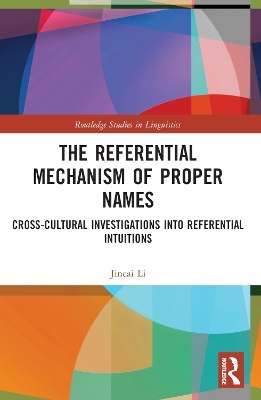
The Referential Mechanism of Proper Names
Cross-cultural Investigations into Referential Intuitions
Seiten
2024
Routledge (Verlag)
978-0-367-49772-9 (ISBN)
Routledge (Verlag)
978-0-367-49772-9 (ISBN)
This book proposes a linguistic-competence-based account of referential intuitions. Using a series of novel experiments and the subsequent empircal results, Li argues for a fresh construal of the notion of reference and a pluralist account of the referential mechanism of proper names.
Each of us bears a unique name given to us at birth. When people use your name, they typically refer to you. But what is the linkage that ties a name to a person and hence allows it to refer?
Li’s book approaches this question of reference empirically through the medium of referential intuitions. Building on the literature on philosophical and linguistic intuitions, she proposes a linguistic-competence-based account of referential intuitions. Subsequently, using a series of novel experiments, she investigates the variation of referential intuitions across different cultures, as well as the developmental trajectory and the underlying causes of the observed cultural differences. What she finds is that the cultural patterns of referential intuitions are already in place around age seven, and the differences are largely attributable to the distinct perspective-taking strategies favoured by easterners and westerners, rather than the moral valence of actions involved in the experimental materials. These results are taken to better support referential pluralism (in particular, the ambiguous view) than referential monism.
By undertaking this fascinating research, Li’s book provides new insights into the cognitive mechanism underlying people’s referential usage of names. It will be valuable to students and scholars of linguistics, philosophy of language and experimental philosophy, and in particular, to those who research into semantic intuitions and theories of reference.
Each of us bears a unique name given to us at birth. When people use your name, they typically refer to you. But what is the linkage that ties a name to a person and hence allows it to refer?
Li’s book approaches this question of reference empirically through the medium of referential intuitions. Building on the literature on philosophical and linguistic intuitions, she proposes a linguistic-competence-based account of referential intuitions. Subsequently, using a series of novel experiments, she investigates the variation of referential intuitions across different cultures, as well as the developmental trajectory and the underlying causes of the observed cultural differences. What she finds is that the cultural patterns of referential intuitions are already in place around age seven, and the differences are largely attributable to the distinct perspective-taking strategies favoured by easterners and westerners, rather than the moral valence of actions involved in the experimental materials. These results are taken to better support referential pluralism (in particular, the ambiguous view) than referential monism.
By undertaking this fascinating research, Li’s book provides new insights into the cognitive mechanism underlying people’s referential usage of names. It will be valuable to students and scholars of linguistics, philosophy of language and experimental philosophy, and in particular, to those who research into semantic intuitions and theories of reference.
Jincai Li is Lecturer in the Department of English at East China Normal University, China. Her research interests include experimental philosophy, experimental pragmatics, and experimental semantics. She has published in Cognition, Journal of Semantics and some prestigious Chinese journals.
1. Introduction: Proper Names and Reference 2. Classical Theories of Reference of Proper Names 3. An Account of Referential Intuitions 4. The Cross-cultural Variation in Referential Intuitions 5. The Effects of Moral Valence on Referential Intuitions 6. The Effects of Perspective-taking on Referential Intuitions 7. Theorizing the Reference of Proper Names 8. Conclusions
| Erscheinungsdatum | 05.09.2022 |
|---|---|
| Reihe/Serie | Routledge Studies in Linguistics |
| Zusatzinfo | 10 Tables, black and white; 11 Line drawings, black and white; 11 Illustrations, black and white |
| Verlagsort | London |
| Sprache | englisch |
| Maße | 156 x 234 mm |
| Gewicht | 453 g |
| Themenwelt | Geisteswissenschaften ► Philosophie ► Sprachphilosophie |
| Geisteswissenschaften ► Sprach- / Literaturwissenschaft ► Anglistik / Amerikanistik | |
| Geisteswissenschaften ► Sprach- / Literaturwissenschaft ► Literaturwissenschaft | |
| Geisteswissenschaften ► Sprach- / Literaturwissenschaft ► Sprachwissenschaft | |
| ISBN-10 | 0-367-49772-7 / 0367497727 |
| ISBN-13 | 978-0-367-49772-9 / 9780367497729 |
| Zustand | Neuware |
| Informationen gemäß Produktsicherheitsverordnung (GPSR) | |
| Haben Sie eine Frage zum Produkt? |
Mehr entdecken
aus dem Bereich
aus dem Bereich
Wie die Menschheit zu ihrer größten Erfindung kam
Buch | Softcover (2022)
C.H.Beck (Verlag)
18,00 €
Macht und Legitimität politischer Sprache im Prozess der europäischen …
Buch | Softcover (2023)
Nomos (Verlag)
74,00 €


